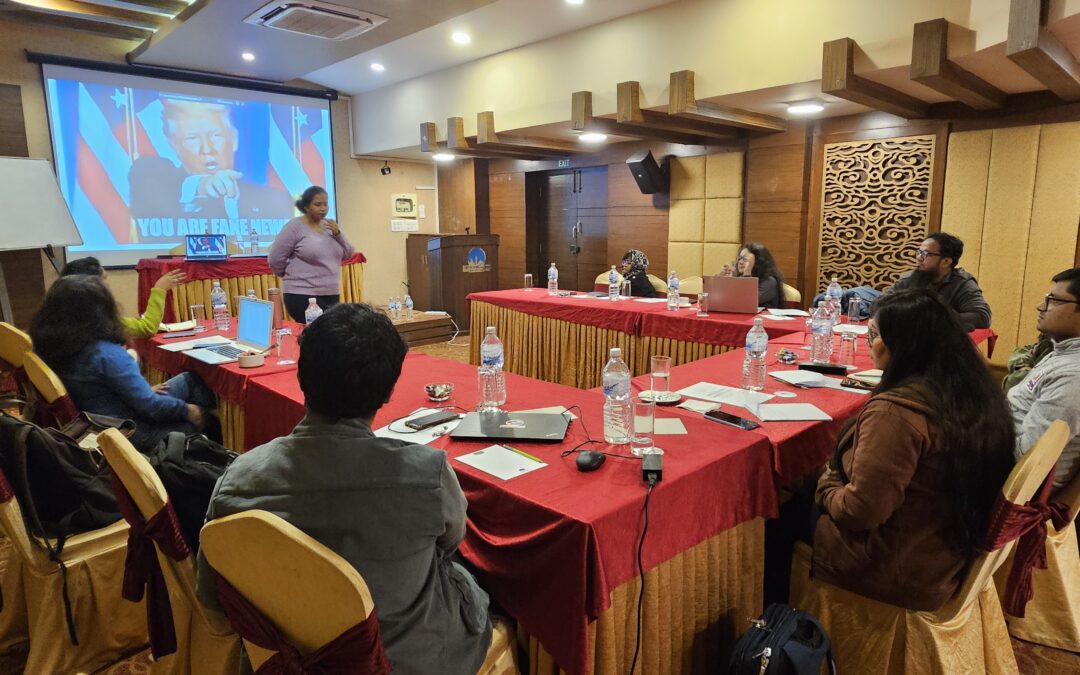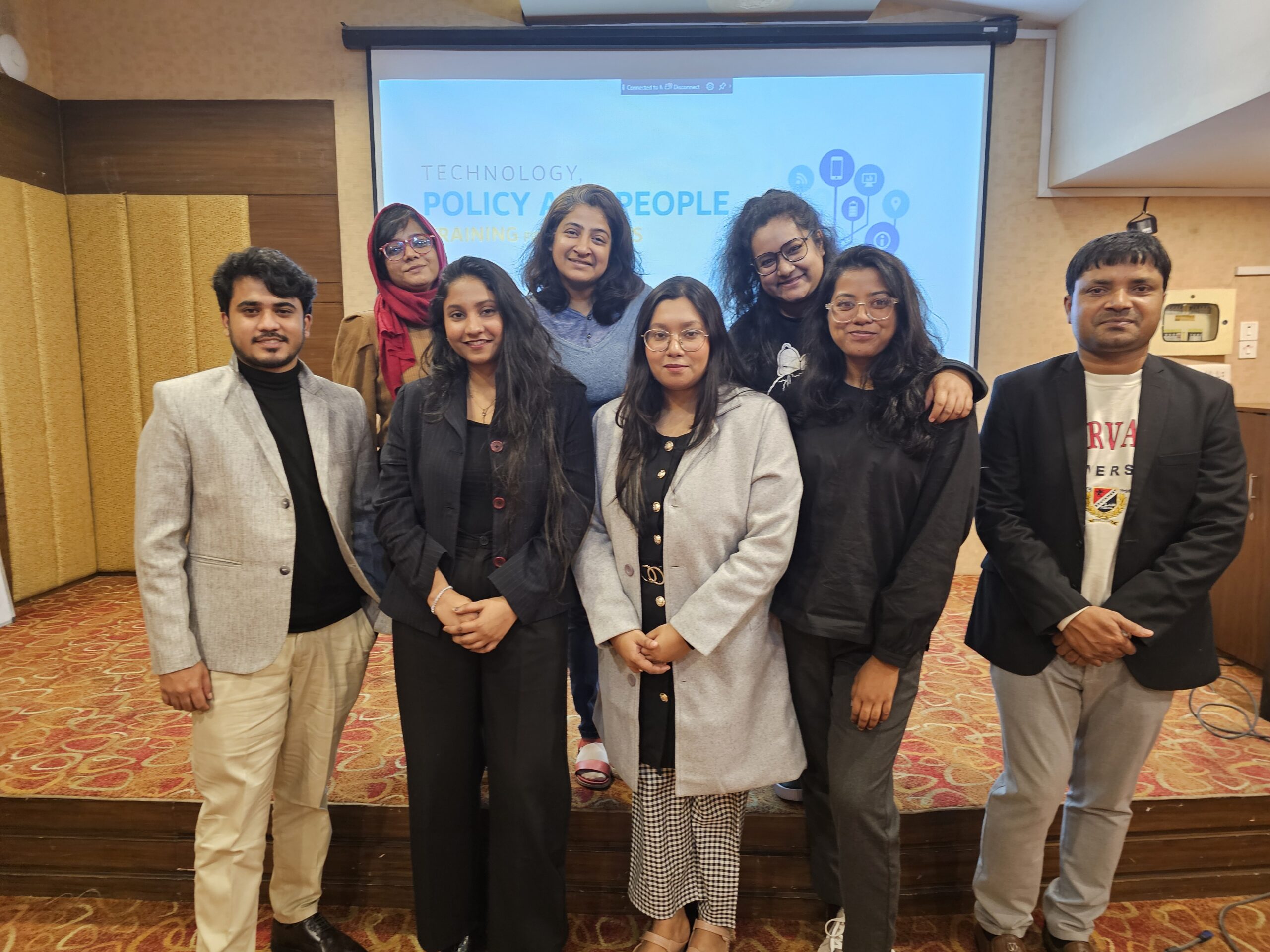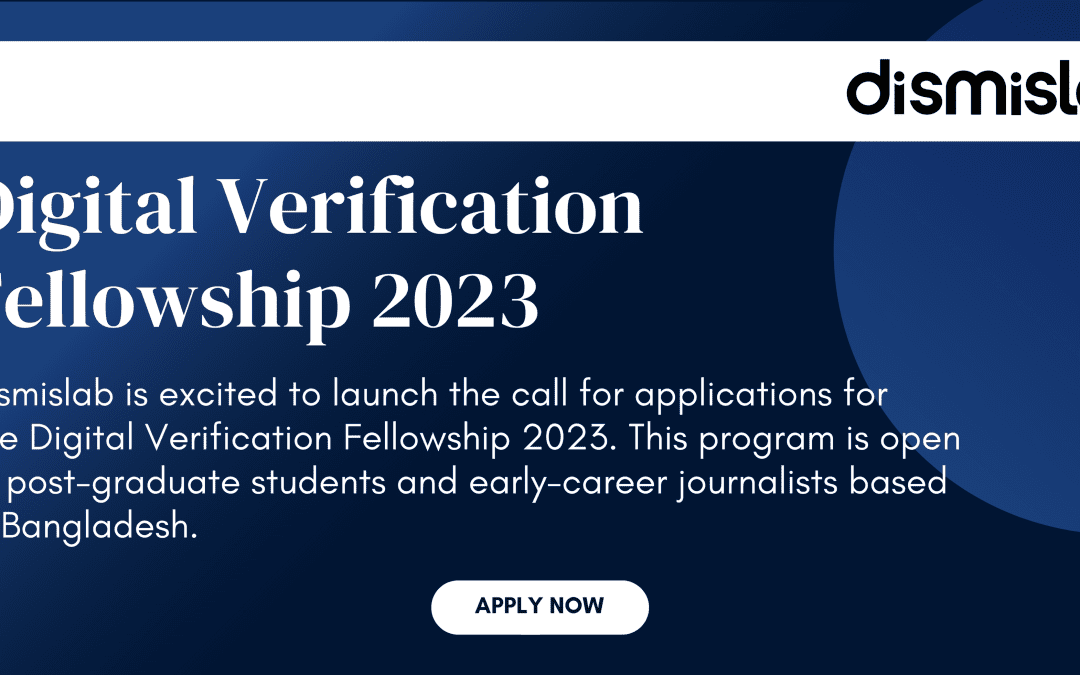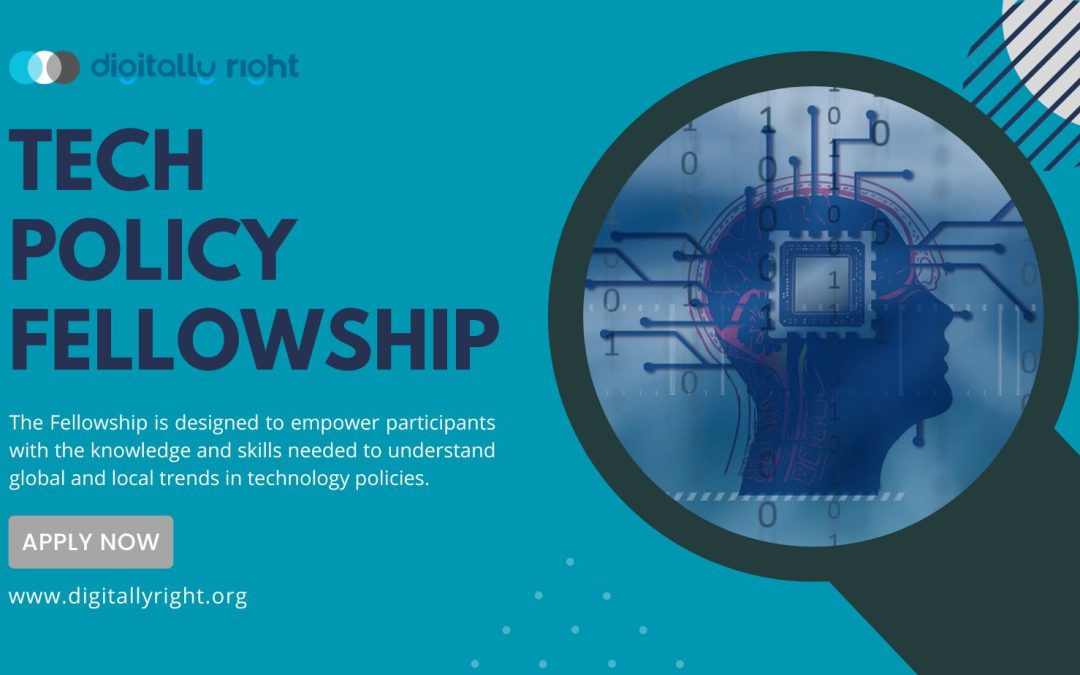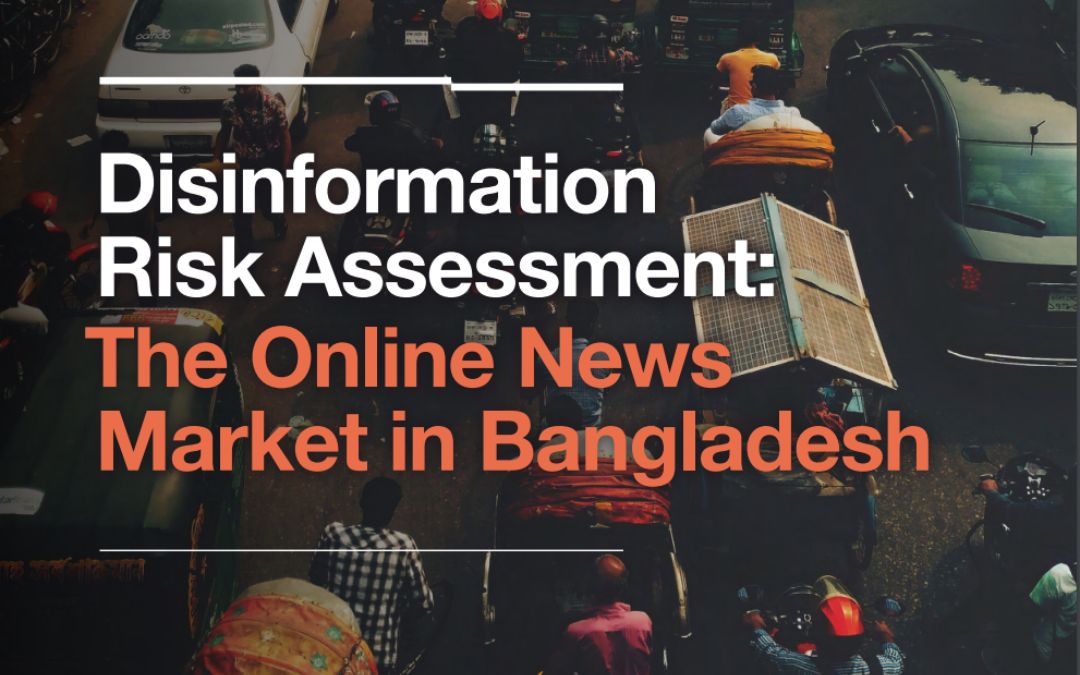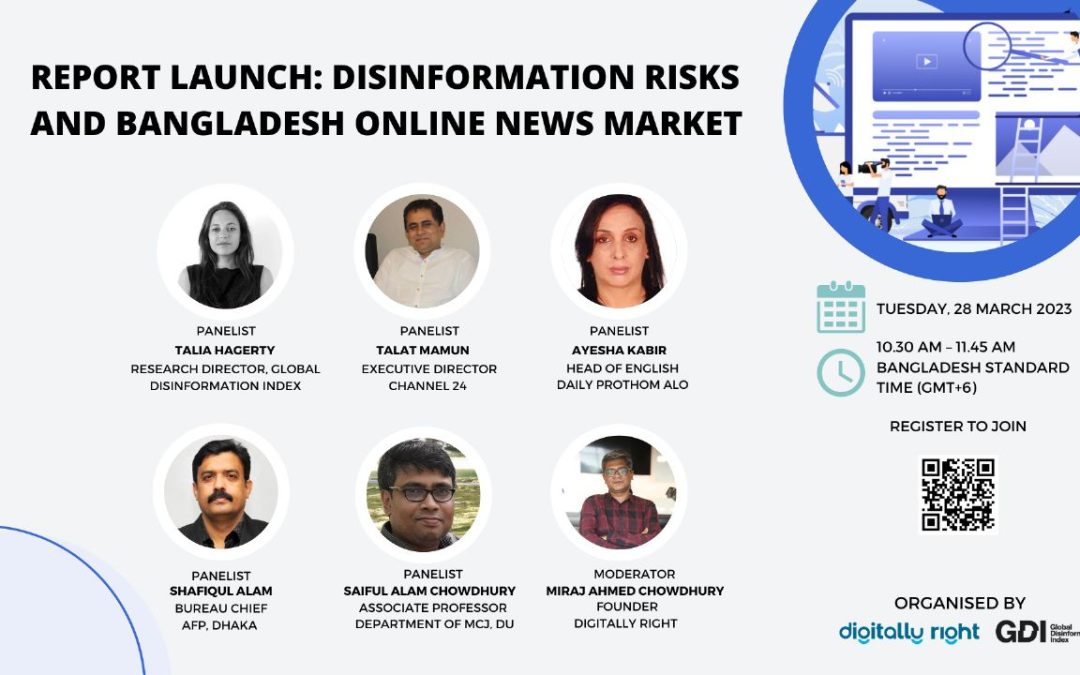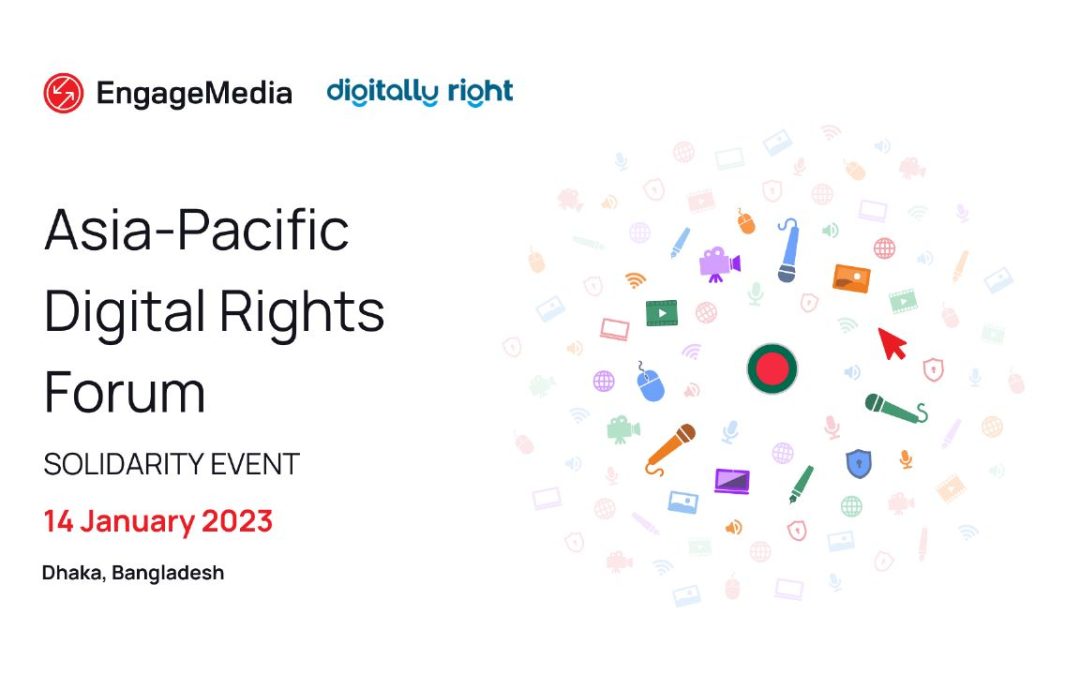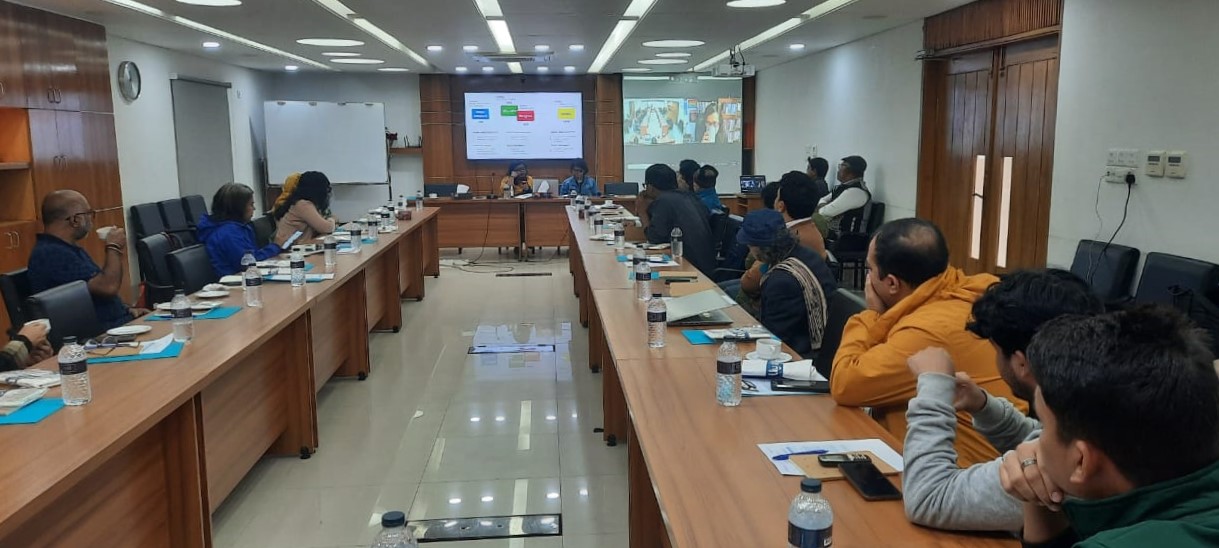
by Digitally Right | Feb 12, 2024 | Our work, Updates
Eight young professionals from law, academia, media, and civil society organizations in Bangladesh have joined Digitally Right in its flagship annual Tech Policy Fellowship program of 2023. The diverse set of fellows aims to explore various issues arising from technology and related policies, affecting different communities.
The six-month program provides a unique opportunity to gain a deeper understanding of technology-related policies in Bangladesh and the region, along with their implications for everyday life. The goal is to develop the next generation of advocates to shape the legal and policy domain in Bangladesh for a more open and free internet space.
The fellowship includes residential training, deep-dive sessions, mentoring, and research production on a contemporary issue related to technology and society. It also facilitates engagement and networking with the global and regional digital rights community. Access Now, an international non-profit promoting digital rights worldwide, is a knowledge partner in this fellowship program.
The fellowship program commenced in January of this year with a five-day residential training in Kathmandu, Nepal, in collaboration with Access Now. Representatives and experts from six organizations in civil society, technology, and academia joined the fellows to discuss the legal and policy environment shaping internet governance in Bangladesh and beyond.
Each fellow will pursue research under this fellowship program in the next couple of months and will have the opportunity to share their work with the digital rights community in the region and globally.
Meet the Fellows

Dilshad Hossain Dodul, a Senior Lecturer in the Media Studies and Journalism Department of the University of Liberal Arts, has a broad research focus on digital media, migration, and political communication. With a background in Mass Communication and Journalism, including international exposure through the Erasmus Plus Scholarship, Dodul has worked on impactful projects promoting digital awareness and safety, particularly among teenagers and female journalists.
Nazia Sharmin, a Course Contract Faculty at BRAC University, focuses on Digital Sociology, emphasizing socio-cultural aspects of misinformation. With a master’s degree from Stockholm University, Nazia believes that effective tech policies are crucial for defending society against the threats posed by misinformation.
Nowzin Khan, a graduate from BRAC University’s School of Law, is currently pursuing a master’s degree in Peace and Conflict at Dhaka University. An independent researcher with a keen interest in the convergence of technology, governance, and human rights, Nowzin aspires to contribute to comprehensive and unbiased tech policies through active engagement in the Tech Policy Fellowship.
Nusrat Jahan Nishat, currently serving as an Advocacy Manager at ANTAR, Dhaka. With a background in law, she has actively participated in Moot Court Competitions and contributed to human development training programs, workshops, and human rights-related research. Nusrat aims to explore various facets of digital technology and policy issues during her fellowship.
Rashad Ahamad, a journalist with over 13 years of reporting experience in reporting labor and human rights. Currently working at ‘New Age,’ Rashad has covered a wide range of topics, including migration, disinformation, health, climate, and labor rights. His commitment to public-interest reporting has earned him awards and fellowships, and he remains interested in the intersection of data, labor rights and technology.
Shoeb Abdullah is a fact-checker, researcher, and digital rights advocate. Currently engaged with Internews, Shoeb’s career spans nearly five years, contributing to combating disinformation, and advancing digital rights. His expertise includes internet Freedom, digital safety, and anti-internet shutdown activism.
Suhadha Akter Afrin, a staff reporter of Prothom Alo, is a technology journalism enthusiast covering ICT and digital security issues. Actively following upcoming digital laws and policies, she is keen to understand the impact of these policies on society. Suhadha aims to keep the people informed about the developments in the digital sector.
Suparna Roy, a legal professional dedicated to justice and equality, serves as a Legal Expert to ensure basic human rights for SOGIESC and marginalized communities in Bangladesh. Beyond her professional roles, Suparna is a passionate human rights activist advocating for gender equality and societal transformation.

by admin | Oct 21, 2023 | Our work, Updates
Digitally Right under its Dismislab project is excited to launch the call for applications for The Digital Verification Fellowship 2023. This fellowship is open to graduate students and early-career journalists based in Bangladesh.
This program is a 3-month paid fellowship opportunity with certificates for individuals who are dedicated to advancing the understanding of the online disinformation research and fact-checking within and outside newsrooms. It provides a unique platform to gain hands-on experience, collaborate with experts, and contribute to tackling mis/disinformation. High performers will also have the prospect to work full-time for Dismislab, a bilingual information lab working for online verification and media research.
Key Goals of the Fellowship:
- Apprehend the Global and Local Digital Information Ecosystem: Dive deep into the world of digital information to understand its global and local dynamics.
- Understand Information Disorder: Explore the various facets of information disorder, including disinformation, misinformation, and malinformation.
- Grasp Verification of Online Information: Master the art of verifying digital information using the latest tools and techniques.
- Use the Latest Tools and Techniques to Verify Mis/Disinformation:Develop practical skills to identify and counteract mis and disinformation in digital content.
- Institute a Culture of Fact-Checking in organizations: Work on projects and initiatives to promote fact-checking and accuracy in media organizations.
Important Dates:
- Application Deadline: Oct 26, 2023
- Fellowship Start Date: Nov 15, 2023
- Fellowship End Date: Feb 15, 2024
To apply for the Digital Verification Fellowship 2023, please click here.
For inquiries or more information, please contact: editor@dismislab.com

by Digitally Right | Oct 10, 2023 | Our work, Updates
Digitally Right is excited to launch the call for applications for The Bangladesh Tech Policy Fellowship 2023. This program is open to young and mid-career professionals in academia, law, journalism, tech and civic advocacy organizations.
In an era where digital and physical realities are intertwined, the influence of technology policies on our daily lives is profound. From government legislations to platform policies to international principles, these policies shape how we express ourselves, access information, conduct business, and innovate. The fellowship offers an opportunity to explore the impact of technology on our lives and the resulting implications for policies and policymakers.
The Fellowship is designed to empower participants with the knowledge and skills needed to understand global and local trends in technology policies. It includes in-depth training, expert mentoring, and the opportunity to conduct research on a policy issue. Participants will contribute to the discourse by producing research papers, policy briefs, or articles and a stipend to cover research expenses.
Be part of a transformative journey!
Fellowship Topics
Applicants interested in this fellowship will be required to submit research proposals as a crucial part of the application process. The excellence of these proposals will play a vital role in the selection of the most qualified candidates. While there is a wide array of tech policy topics to consider, this fellowship concentrates on four primary areas of focus.
- Online Safety and Security
- Content Governance and Free Expression
- Equal and Open Internet Access
- Privacy and Data Protection
What’s in it for you?
- A 4-day in-person workshop focusing on tech policies.
- Participate in 3 virtual in-depth sessions with global experts.
- Produce and publish research papers/articles under expert mentoring.
- Showcase your work to an esteemed audience.
- Become part of a regional network of tech policy enthusiasts.
- Receive a modest stipend throughout the 5-month program.
Eligibility
The Tech Policy Fellowship is designed for individuals who envision professional development opportunities in the fields of tech policy, digital rights advocacy, and civic technology. We encourage applications from any Bangladeshi who has an interest in these areas, and the selection process will primarily consider the quality of the research proposal and the applicant’s personal commitment. However, preference will be given to candidates who meet the following criteria:
- Early and mid-career professionals.
- Backgrounds in law, journalism, academia, or civic advocacy are highly desirable.
- Age within the range of 26 to 35 years.
- Demonstrated relevance of the program to the candidate’s professional work.
Eight exceptional candidates will be chosen based on the strength of their applications. Notifications regarding the selection will be sent out by November 7th.
If you find yourself intrigued, possess a compelling research idea, and believe that participating in this fellowship can have a meaningful impact on both your career and the broader domain of tech policy, we strongly encourage you to submit an application.
📆 Application Deadline: November 1, 2023
🔗 Registration Link: https://shorturl.at/deWY3

by Digitally Right | Mar 28, 2023 | Our work, Research, Updates
Digitally Right has partnered with the Global Disinformation Index (GDI) to launch a pioneering report titled “Disinformation Risk Assessment: The Online News Market in Bangladesh”. The report provides insights on the dangers of disinformation in Bangladesh’s media industry, based on a study of 33 news domains.
The report was unveiled during an online event on March 28th, 2023, which included presentations from the Research Director at the Global Disinformation Index, and Digitally Right’s Founder, Miraj Ahmed Chowdhury. The event featured Shafiqul Alam, Bureau Chief at AFP, Dhaka, Ayesha Kabir, Head of English, Prothom Alo, Talat Mamun, Executive Director, Channel 24, and Saiful Alam Chowdhury, Associate Professor, Dhaka University, who shared their insights on the report.
The report presents GDI’s findings on disinformation risks in the media market of Bangladesh, based on a study of 33 news domains, and aims to provide an overview of the media market as a whole and its strengths and vulnerabilities.
The assessment found that all 33 domains had a medium to high risk of disinforming their users, including respected sites known for their independent news coverage. Sixteen sites had a high disinformation risk rating, and half of the sample had a medium risk rating. However, no site performed so poorly as to earn a maximum risk rating.
According to the findings, the main source of disinformation risk in Bangladesh media sites is the lack of transparent operational checks and balances. While all sites scored strongly in presenting unbiased, neutral, and accurate articles, 28 sites had no form of accuracy policy on their websites. Most sites lacked policies for editorial checks and balances including for post publication corrections, comment moderation, byline information, fact checking, and sourcing as well as clarity on funding and ownership structures.
The report highlights operational shortcomings that are hampering trust and transparency in the media industry. Recommendations made in the report urge news sites to adopt and make transparent universal standards of good journalistic practices, such as publishing beneficial ownership and funding information, maintaining a corrections policy, publishing bylines policies, and sourcing guidelines.
The findings show many of the operational issues afflicting the Bangladeshi websites can easily be fixed by adopting and making transparent universal standards of good journalistic practices as agreed upon by the Journalism Trust Initiative.
This risk-rating framework for Bangladesh provides crucial information to enable decision-makers to stem the tide of money that incentivizes and sustains disinformation and the report is aimed to encourage greater transparency and accountability in Bangladesh’s media landscape.
Download the report here.

by Digitally Right | Mar 19, 2023 | Our work, Updates
Digitally Right and the Global Disinformation Index (GDI) are launching a study into the disinformation risks on digital news platforms in Bangladesh. The study is based on an assessment of editorial and operational transparency in 33 Bangladeshi news domains creating an index that intends to serve the media and advertisers that they can utilize to defund disinformation.
The virtual launch event for the report is scheduled for 10:30 am on March 28th, 2023, and it will be held on Zoom. The event will feature an expert panel of media editors, researchers, and representatives from GDI and Digitally Right. To register for the event, please visit the following link: https://zoom.us/webinar/register/WN_0hTiIud-RHelA54ep1C0pw
The expansion of news into the online world has exposed the industry to new risks of disinformation, which can be financially incentivized for news websites. Disinformation can have harmful consequences, such as disrupting society’s shared sense of accepted facts and undermining public health and safety.
To combat ad-funded disinformation, GDI provides independent, trusted, and neutral ratings of news domains’ risk of disinforming their readers. These ratings can be used by advertisers, ad tech companies, and platforms to redirect their online ad spending in line with their brand safety and disinformation risk-mitigation strategies.
In 2022, GDI rated the disinformation risks of news sites in 20 countries around the world. Digitally Right, a Dhaka based media and technology research company collaborated with GDI to conduct the online news market assessment in Bangladesh.
We invite you to the launch event of the report titled “Disinformation Risk Assessment: The Online News Market in Bangladesh,” and a panel discussion that focuses on the risk of disinformation, trust in media, and their impact on media sustainability.

by admin | Feb 6, 2023 | Our work, Updates
Digitally Right, in partnership with EngageMedia, co-hosted a solidarity event of the Asia-Pacific Digital Rights Forum on January 14, 2023, in Dhaka. The event was attended by around 30 academics, journalists, lawyers, feminists, researchers, and activists from different communities.
It coincided with four other simultaneous solidarity events in Bangkok, Jakarta, Kuala Lumpur, and Manila that aimed to provide spaces for changemakers to meet each other and build stronger regional solidarity.
The Dhaka event featured sessions on online media freedom, hate speech, online gender-based violence (OGBV), and a focus group discussion (FGD) on the use of open and secure technology. Toward the end of the day, the group shared their learnings with their peers in the four other solidarity events through a virtual video call.

The event started with a session on online media freedom and censorship, which tackled issues ranging from the key actors involved in restricting free speech to discussions on reasonable restrictions to speech without hindering fundamental rights.
The second session on online hate speech and OGBV opened discussions on feminist politics, social justice movements, and backlash against gender equality in the digital space. Participants also talked about the reality and impact of online hate speech and gender-based violence in the Global South, especially in Bangladesh. According to a November 2021 survey, cases of OGBV increased during the pandemic, with 63.51 percent of 359 respondents saying they faced online violence.
The solidarity event concluded with an FGD to assess the awareness of civil society organizations, human rights defenders, and digital rights advocates in Bangladesh regarding online threats and surveillance. Participants discussed their understanding of ways to mitigate these threats using open and secure technology – such as by using virtual private networks, encrypted password managers, and secure messaging apps. The discussions also scrutinized the reasons behind the use or non-use of such technologies and how changemakers can work in more secure, ethical, and sustainable ways.
